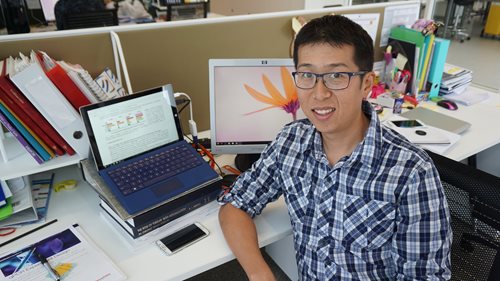March 30, 2016 Print
The Westmead Institute’s Dr Lawrence Ong has been awarded a $122,714 MS Research Australia / NHMRC Betty Cuthbert Postgraduate scholarship to explore the role of vitamin D and genetic susceptibility in multiple sclerosis.
 Dr Lawrence Ong is studying the role of vitamin D in multiple sclerosis
Dr Lawrence Ong is studying the role of vitamin D in multiple sclerosis
The scholarship, which is a partnership between MS Research Australia and NHMRC, will run over three years. The MS Research Australia component of this scholarship will be fully supported by the Trish MS Research Foundation.
The aim of Dr Ong’s research is to determine the mechanisms by which genes involved in activating vitamin D and susceptibility to MS make individuals more, or less, prone to developing the disease.
According to Dr Ong, who is a clinician trained in immunology, this project is innovative in its aim to identify specific molecular pathways that are regulated by the vitamin D receptor using state of the art technologies.
“We already know that there is a link between low vitamin D and susceptibility to autoimmune diseases, including multiple sclerosis. This work will extend on this knowledge, and hopefully unlock the mechanisms by which this link with vitamin D is thought to cause disease,” Dr Ong said.
“We already know that there is a link between low vitamin D and susceptibility to autoimmune diseases, including multiple sclerosis. This work will extend on this knowledge, and hopefully unlock the mechanisms by which this link with vitamin D is thought to cause disease,” Dr Ong said.
“Identification of these pathways may provide a target for directed therapy for treatment or prevention of MS in susceptible individuals. This understanding may also provide an insight in other autoimmune diseases.”
“We are in the age now where there are so many new and emerging therapies but they are all rather blunt, in a sense. They suppress the immune system to the extent where patients can get infections. If we can find a more targeted therapy which can avoid some of those immunosuppressive side effects, it would be highly advantageous.”
Dr Ong joins the Institute’s Immunogenetics Group. Headed by Professor David Booth, the group seeks to understand how genetic variation contributes to autoimmune disease risk.
A recent discovery by Professor Booth’s team showed how immune cells are controlled by vitamin D. The research, published in Genes and Immunity and supported by MS Research Australia, demonstrated that vitamin D ‘turns on’ three genes which play a role in MS in a specific type of cells called myeloid cells.